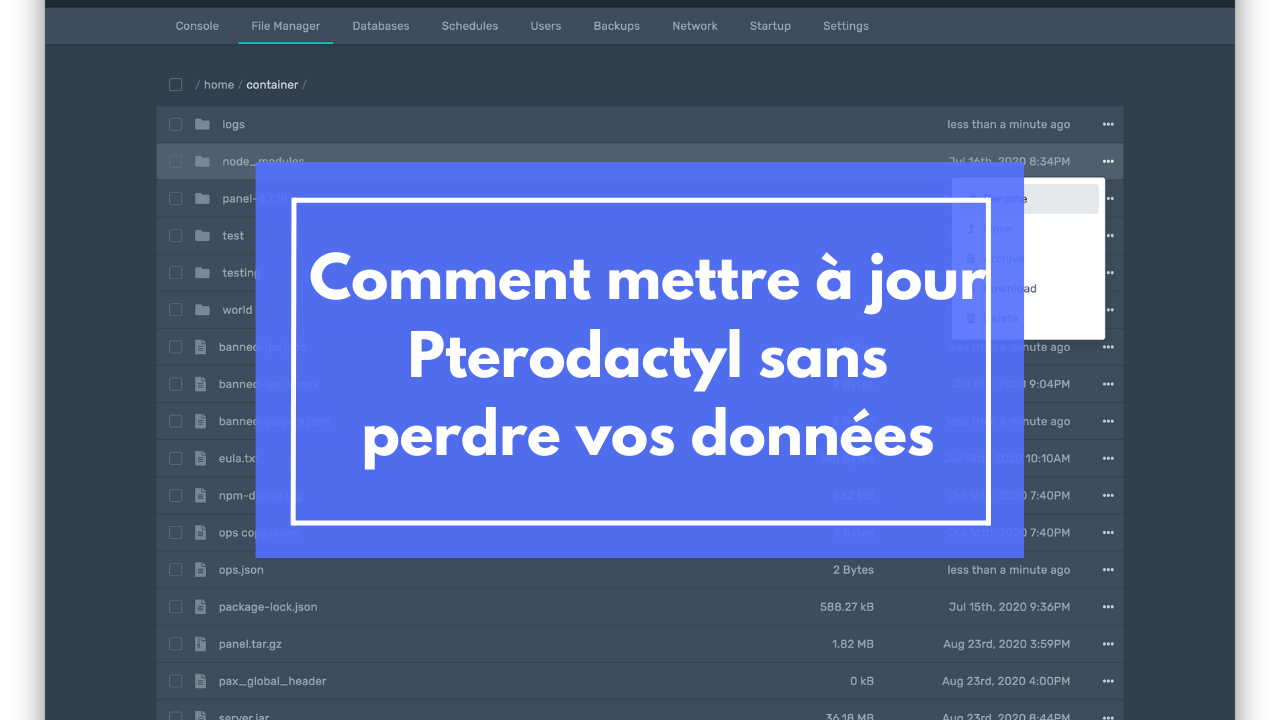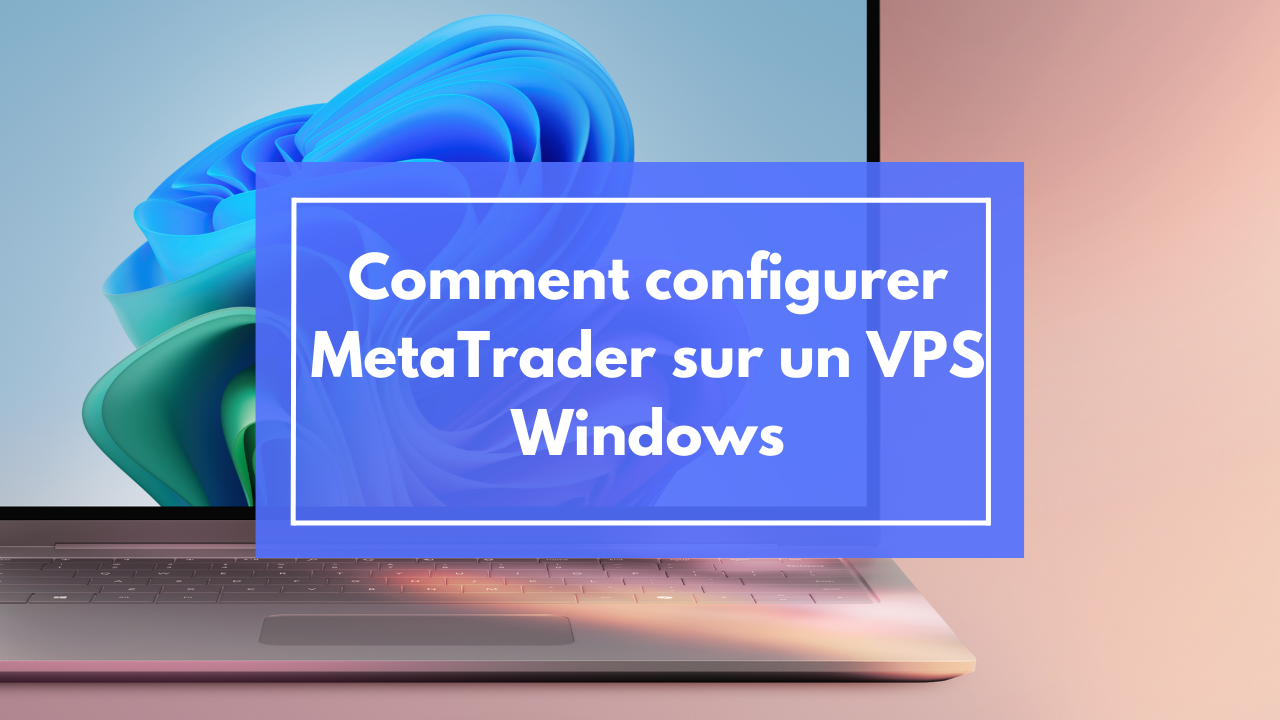How to update Pterodactyl without losing your data
Pterodactyl, the open-source game server management system, is constantly evolving to offer new features and improvements. However, updating such a system can be tricky, especially when it comes to preserving your valuable data. In this article, we will explore in detail the process of updating Pterodactyl, with a focus on preserving your critical information. Whether you are an experienced administrator or a new user, this guide will help you navigate the update steps smoothly, minimizing risks and maximizing benefits.
Understanding the Importance of Pterodactyl Updates
Regularly updating Pterodactyl is crucial for several reasons. First, it allows you to benefit from the latest features and improvements brought by the development team. These new versions may include more efficient management tools, an improved user interface, or new customization options for your game servers.
Additionally, updates are essential for the security of your infrastructure. They often fix vulnerabilities discovered in previous versions, thereby strengthening the protection of your servers and your users' data against potential threats.
Finally, staying up to date allows you to maintain compatibility with the latest versions of games and plugins, ensuring an optimal experience for your players.
However, updating a system as complex as Pterodactyl requires a methodical and cautious approach. A poorly executed update could lead to unexpected downtime, incompatibilities with certain plugins, or, in the worst case, data loss. This is why it is crucial to follow a rigorous process and take the necessary precautions to protect your data throughout the update.
Preparing Your Environment for the Update
Before diving into the update process, it is essential to carefully prepare your environment. This preliminary step will help you minimize risks and ensure a smooth update process.
Checking System Prerequisites
Start by verifying that your system meets the requirements for the new version of Pterodactyl. Consult the official documentation to find out the minimum required versions of PHP, MySQL, and other dependencies. For example, Pterodactyl version 1.11.x requires PHP 8.2 or 8.3, as well as Composer 2.X.
To check your PHP version, run the following command in your terminal:
php -v
For Composer, use:
composer --version
If your versions do not meet the requirements, you will need to update these components before proceeding with the Pterodactyl update.
Full Backup of Your Data
Backup is a crucial step that you should never neglect. Before any update, perform a full backup of your Pterodactyl database and all important files. This includes:
To back up your database, you can use the following command:
mysqldump -u user -p database_name > pterodactyl_backup.sql
Remember to replace "user" and "database_name" with your specific information.
For files, you can use a tar command:
tar -czvf pterodactyl_backup.tar.gz /path/to/pterodactyl
Ensure that these backups are stored in a safe place, ideally on a different medium than where Pterodactyl is installed.
Verifying the Integrity of the Current System
Before proceeding with the update, it is wise to verify that your current Pterodactyl installation is functioning correctly. Check the logs for any errors or warnings that might indicate underlying issues. Resolve these issues before starting the update to prevent them from worsening or interfering with the process.
Downloading and Preparing New Files
Once your environment is prepared, the next step is to obtain the new Pterodactyl files and prepare them for installation.
Obtaining the Latest Version
Visit the official Pterodactyl GitHub repository to download the latest stable version. You can use the curl command to download the archive directly to your server:
curl -L https://github.com/pterodactyl/panel/releases/latest/download/panel.tar.gz | tar -xzv
This command will download the latest version's archive and automatically extract it in the current directory.
Verifying the Integrity of Downloaded Files
After downloading, it is important to verify the integrity of the files to ensure they were not corrupted during transfer. Compare the SHA256 hash of the downloaded archive with the one provided on the GitHub release page.
sha256sum panel.tar.gz
Compare the result with the hash provided on GitHub. If they match, you can be sure that the download was successful.
Configuring Permissions
Once the new files are in place, it is crucial to set the correct permissions to ensure Pterodactyl functions properly. Use the following commands:
chmod -R 755 storage/* bootstrap/cache
This command ensures that the storage and cache directories are readable and writable by the web server.
Updating Dependencies
Updating dependencies is a crucial step to ensure compatibility and proper functioning of the new Pterodactyl version.
Updating via Composer
Use Composer to update all of Pterodactyl's dependencies. Run the following command in the root directory of your installation:
composer install --no-dev --optimize-autoloader
This command will install all necessary dependencies, excluding those intended for development, and optimize the autoloader for better performance.
Managing Potential Conflicts
It may happen that some dependencies conflict with other components of your system. If you encounter errors while updating dependencies, carefully review the error messages. You may need to manually resolve some conflicts by adjusting package versions in the composer.json file.
Clearing the Cache
After updating dependencies, it is recommended to clear the application cache to avoid any issues related to old cached configurations or data. Use the following commands:
php artisan view:clear php artisan config:clear
These commands will clear the compiled views cache and the configuration cache, respectively.
Updating the Database
Updating the database structure is a critical step to ensure compatibility with the new version of Pterodactyl.
Running Migrations
Pterodactyl uses migrations to manage changes to the database structure. To apply these migrations, run the following command:
php artisan migrate --seed --force
This command will apply all new migrations and update the necessary base data. The --force option is used to run migrations in production mode.
Verifying Data Integrity
After running the migrations, it is crucial to verify the integrity of your data. Connect to your database and run some queries to ensure that important data is still present and correctly structured.
Optimizing the Database
To optimize performance after the update, you can run an optimization command on your MySQL database:
mysqlcheck -o database_name -u user -p
This command will optimize all tables in your Pterodactyl database, which can improve performance, especially after significant structural changes.
Post-Update Configuration
Once the base update is complete, it is important to review and adjust Pterodactyl's configuration to fully leverage the new features and ensure everything is working correctly.
Reviewing Configuration Files
Carefully examine the .env file and other configuration files in the config/ directory. Compare them with the new configuration files provided in the update to identify any new options or necessary changes.
Updating File Permissions
Ensure that file permissions are correctly set after the update. Use the following command, replacing www-data with your web server user if necessary:
chown -R www-data:www-data /var/www/pterodactyl/*
Restarting Queue Workers
After each update, it is important to restart the queue workers to ensure they are using the new code. Run the following command:
php artisan queue:restart
Testing and Verification
Before considering the update complete, it is essential to conduct thorough testing to ensure everything works as expected.
Checking the Admin Interface
Log in to the Pterodactyl admin interface and navigate through the different sections. Verify that all features are accessible and functioning correctly. Pay special attention to new features introduced in the update.
Testing Game Servers
Start a few game servers to ensure they launch correctly and are accessible. Verify that the game consoles work and that you can interact with the servers as expected.
Checking Logs
Carefully review the Pterodactyl and web server logs to detect any errors or warnings that might indicate hidden issues. The logs are usually located in the storage/logs/ directory of your Pterodactyl installation.
Updating Wings
Wings, the server component of Pterodactyl, must also be updated to ensure full compatibility with the new panel version.
Checking Compatibility
Ensure that the version of Wings you are using is compatible with the new panel version. Consult the official documentation for compatible versions.
Wings Update Process
Updating Wings generally involves downloading the new version and replacing the old binary. Here are the typical steps:
-
Stop the current Wings service: systemctl stop wings
-
Download the new version of Wings: curl -L -o /usr/local/bin/wings https://github.com/pterodactyl/wings/releases/latest/download/wings_linux_amd64
-
Give execution permissions to the new binary: chmod u+x /usr/local/bin/wings
-
Restart the Wings service: systemctl restart wings
Post-Update Verification
After updating Wings, check the logs to ensure it starts correctly and connects to the panel without errors. You can view the logs with the command:
journalctl -u wings
Handling Common Errors
Despite careful preparation, you may encounter errors during the update. Here are some common issues and their solutions.
Database Errors
If you encounter errors during database migrations, verify that your database is up to date and that you have the necessary permissions. You can try re-running the migrations with:
php artisan migrate:fresh --seed --force
Be careful, as this command will completely reset your database. Use it only as a last resort and ensure you have a backup.
Permission Issues
Permission errors are common after an update. Verify that all files and directories have the correct permissions and are owned by the correct web server user.
Cache Errors
If you encounter cache-related errors, try clearing it completely:
php artisan cache:clear php artisan view:clear php artisan config:clear
Post-Update Optimization
Once the update is complete and verified, you can proceed with some optimizations to improve the performance of your Pterodactyl installation.
Optimizing Composer Autoloader
Run the following command to optimize the Composer autoloader:
composer dump-autoload --optimize
This command will generate an optimized autoload file, which can slightly improve application loading performance.
Cache Configuration
Enable configuration and route caching to improve performance:
php artisan config:cache php artisan route:cache
Note that you will need to clear these caches whenever you modify the configuration or routes.
Database Optimization
You can regularly optimize your database to maintain good performance:
mysqlcheck -o database_name -u user -p
Ongoing Maintenance
Updating is not a one-time task but rather an ongoing process to keep your Pterodactyl installation secure and performant.
Regular Monitoring
Set up regular monitoring of your Pterodactyl installation. Use monitoring tools to track server performance, resource usage, and quickly detect any potential issues.
Security Updates
Stay alert for security updates for Pterodactyl and all associated components (PHP, MySQL, etc.). Apply these updates as soon as possible to maintain the security of your system.
Planning Future Updates
Establish a regular schedule to check and apply updates. This could be monthly or quarterly, depending on your needs and the frequency of Pterodactyl releases.
Conclusion
Updating Pterodactyl is a crucial process to keep your game server management platform up to date, secure, and performant. By meticulously following the steps outlined in this article, you can minimize risks and ensure a smooth transition to the new version while preserving your valuable data.
Remember that the key to a successful update lies in careful preparation, attentive execution, and thorough post-update verification. Do not hesitate to consult the official Pterodactyl documentation and seek help from the community if you encounter difficulties.
By regularly keeping your installation up to date, you provide your users with an optimal experience and ensure that your infrastructure remains robust and secure in the face of future challenges in the online gaming world.

Name des Autors
OUIHEBERG SARL
Kategorien
Tutoriels
Date
14/02/2025
Die Pluspunkte des Artikels





